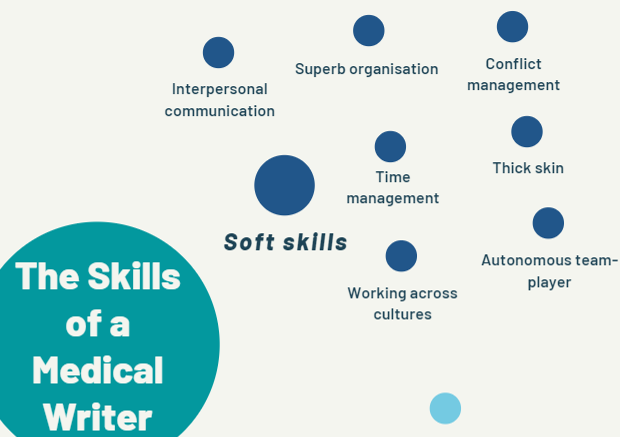What do you think people will assume about you when you tell them you work as a Medical Writer?
My experience is that people think that I’m a medical doctor and I speak and write perfect English.
The irony is that neither being a medical doctor nor knowing English perfectly are the main qualities of a Medical Writer.
A Medical Writer must have
many skills, but as in many professions,
the job is less about the credentials, the tools, and the tasks, and more about the people you work with.
In my opinion, these are the 6 most important soft skills of a Medical Writer.
1. Interpersonal communication and working across cultures
As a Medical Writer, you'll interact with many people by e-mail and in online and offline meetings.
These people will probably come from different countries and be spread all over the world.
This means that they'll bring with them their cultural background: their communication styles, accents, biases, ideas of hierarchy, expectations of behaviour, and much more.
To guarantee a good working environment, you must adapt to people’s different communication styles, always be a diplomat, a good listener, and find a balance of being both professional and amicable.
2. Superb organisation
As a Medical Writer, you'll deal with long documents, different clients’ accounts and teams, and several projects simultaneously.
To keep track of all this, you must organise a growing list of items that increasingly test your focus and patience:
- The content of the documents
- The files others have access to
- Meetings
- Calendars
- E-mail addresses
- Teams accounts
- Share Points
- Passwords
- ID-verification apps
3. Time management
As a Medical Writer, you aim to deliver a high-quality document by a specific date.
This means that you should strike a balance between writing an excellent deliverable and having it delivered on time.
Because there will always be a different, maybe even better, way of writing something, you better learn to let it go.
Punctuality over perfection is the goal!
4. Thick skin
As a Medical Writer, you might like what you write, but you shouldn’t like it so much that you cannot accept major changes to what you wrote and how you wrote it.
You might be the author of the document, but you won’t have the last word on its content and how it’s written.
Some people will politely comment and make suggestions on your writing, but others won’t.
Remember: It’s never personal!
5. Autonomous team-player
As a Medical Writer, you're a part of a team even if you're the only author of a deliverable.
Many people are involved in preparing regulatory documents: physicians, biostatisticians, regulators, clinical associates, scientists, project managers, data managers, other medical writers, etc.
Some companies like for everyone to simultaneously write the document, which is known as collaborative authoring.
Others may leave you writing alone but reviewing the document as a team.
You'll have to adapt to constantly changing between working alone and with others.
6. Conflict management
Dealing with people is dealing with conflicts.
As a Medical Writer, you'll deal with misunderstandings, mismanagement, differing opinions, others overlooking standard processes, and many more sources of tension.
Part of your job will be to calm the waters enough to prevent the project from getting delayed or failing.








